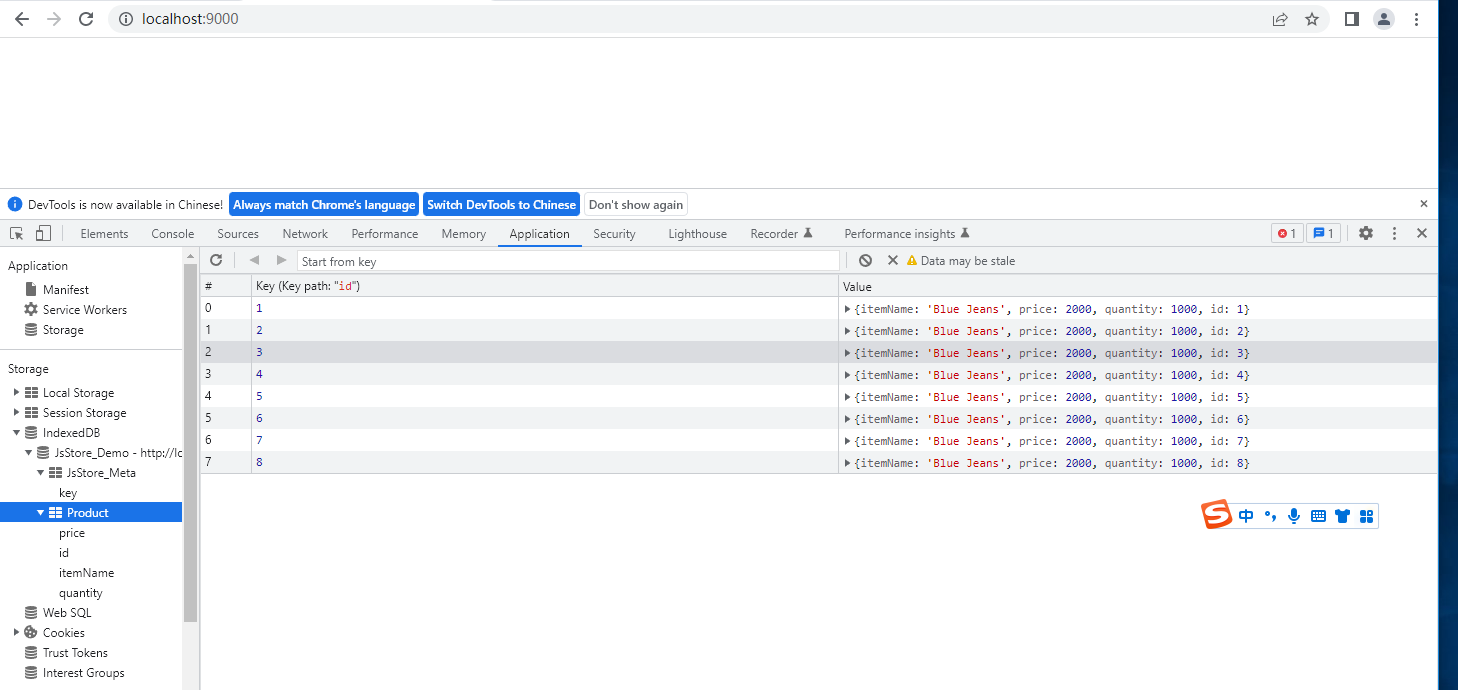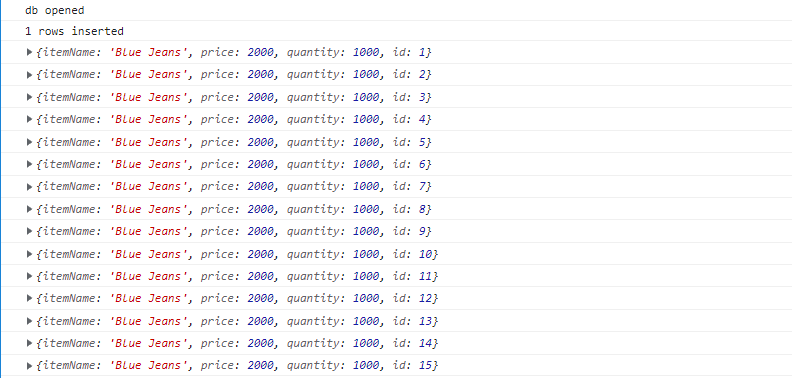背景
- 学习前端新框架、新技术。如果需要做一些数据库的操作来增加demo的体验(CURD流程可以让演示的体验根据丝滑)
- 最开始的时候一个演示程序我们会调用后台,这样其实有一点弊端,就是增加了开发和维护成本,简单的一个demo不应该劳师动众
- 后来我会在demo中使用一些websql,奈何,websql也真的是没前景了。代码写起来也不是特别好
- 下面来介绍下今天的主角indexedDB和jsStore
介绍
- indexedDB可以给浏览器本地存储的能力,并且容量还比较大。
- jsStore只是众多封装的indexedDB库中的一个。可以用一种类似SQL的感觉操作数据
开始
package.json
{
"name": "npm1",
"version": "1.0.0",
"description": "",
"main": "index.js",
"scripts": {
"lint": "eslint scripts/**",
"fix": "eslint scripts/** --fix",
"serve": "webpack serve"
},
"dependencies": {
"jsstore": "^4.4.4",
"lodash": "^4.17.21"
},
"devDependencies": {
"css-loader": "^6.7.1",
"eslint": "^8.23.1",
"eslint-config-google": "^0.14.0",
"eslint-config-prettier": "^8.5.0",
"eslint-plugin-prettier": "^4.2.1",
"file-loader": "^6.2.0",
"html-webpack-plugin": "^5.5.0",
"prettier": "2.7.1",
"style-loader": "^3.3.1",
"webpack": "^5.74.0",
"webpack-cli": "^4.10.0",
"webpack-dev-server": "^4.11.1"
},
"author": "",
"license": "ISC"
}
webpack配置,添加了devServer配置
//webpack.config.js
const path = require("path");
const HtmlWebpackPlugin = require("html-webpack-plugin");
module.exports = {
context: path.resolve(__dirname),
devServer: {
static: {
directory: path.join(__dirname, "dist"),
},
compress: true,
port: 9000,
},
mode: "production",
optimization: {
minimize: false,
},
entry: "./src/main.js",
target: ["web", "es5"],
output: {
clean: true,
filename: "bundle.js",
path: path.resolve(__dirname, "dist"),
},
plugins: [
new HtmlWebpackPlugin({
template: "index.html",
}),
],
module: {
rules: [
{
test: /\.css$/i,
use: ["style-loader", "css-loader"],
},
],
},
};
jsStore链接帮助类,结合webpack+webworker。安装了file-loader
//store-connection.js
import { Connection } from "jsstore";
const getWorkerPath = () => {
// return dev build when env is development
if (process.env.NODE_ENV === "development") {
return require("file-loader?name=scripts/[name].[hash].js!jsstore/dist/jsstore.worker.js");
} else {
// return prod build when env is production
return require("file-loader?name=scripts/[name].[hash].js!jsstore/dist/jsstore.worker.min.js");
}
};
const workerPath = getWorkerPath().default;
export const connection = new Connection(new Worker(workerPath));
主逻辑
//main.js
import { connection } from "./store-connection";
async function init() {
var dbName = "JsStore_Demo";
var tblProduct = {
name: "Product",
columns: {
// Here "Id" is name of column
id: { primaryKey: true, autoIncrement: true },
itemName: { notNull: true, dataType: "string" },
price: { notNull: true, dataType: "number" },
quantity: { notNull: true, dataType: "number" },
},
};
var database = {
name: dbName,
tables: [tblProduct],
};
const isDbCreated = await connection.initDb(database);
if (isDbCreated === true) {
console.log("db created");
// here you can prefill database with some data
} else {
console.log("db opened");
}
var value = {
itemName: "Blue Jeans",
price: 2000,
quantity: 1000,
};
var insertCount = await connection.insert({
into: "Product",
values: [value],
});
console.log(`${insertCount} rows inserted`);
// results will be array of objects
var results = await connection.select({
from: "Product",
});
results.forEach((item) => {
console.log(item);
});
}
window.addEventListener("load", function () {
console.log(connection);
init();
});
数据已经存进去了

API插入、查询也没什么问题

总结
- 使用indexDB强化自己的demo体验,避免搭建后端环境,增加复杂度
- jsStore 的API多了解下,并且涉及的indexedDB的API都是异步的
- API没有啥,主要就是打开链接,事务,CRUD。语法参考下官网的例子即可
原文链接:https://www.cnblogs.com/lee35/p/16736557.html